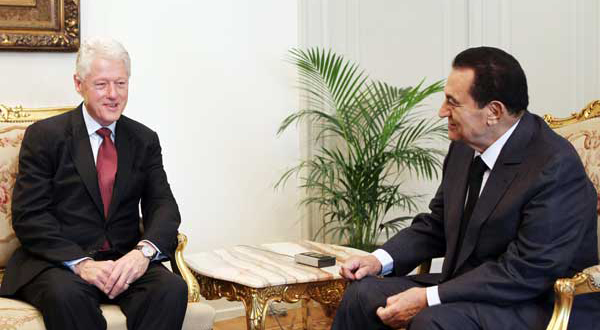 CAIRO: “It’s an exciting time to be alive,” former US President Bill Clinton said at a talk on social responsibility and philanthropy at the Semiramis Intercontinental on Tuesday.
CAIRO: “It’s an exciting time to be alive,” former US President Bill Clinton said at a talk on social responsibility and philanthropy at the Semiramis Intercontinental on Tuesday.
Clinton’s speech, entitled “Embracing Our Common Humanity,” was part of day-long agenda organized by the American Chamber of Commerce in Egypt and the UN Development Program, in partnership with the Egyptian Junior Business Association.
During his short trip to Cairo, Clinton also met Egyptian President Hosni Mubarak. Clinton said he easily forgot Mubarak was over 80 years old.
“At least, he seemed more vigorous than I am when I have jetlag,” Clinton quipped.
Clinton pointed out the difference in living standards since when he first became president, and when the average cell phone weighed 5 pounds, and merely 50 websites existed on the internet. He held up his cell phone to illustrate the advances technology had undergone, where now more than 50 sites had been added since his speech began.
A time of opportunity and advancement, the modern era also posed “enormous problems” of unequal, unstable, and unsustainable practices.
Inequality prevails within and among different countries, said Clinton. Noting that the audience would be surprised should the microphone or screen stop working, or if the water was not drinkable, he said the developed world took quite a bit for granted.
In comparison, 75 percent of Haitians live on $2 per day, while 80 percent have no electricity, said Clinton, who was appointed UN Special Envoy to Haiti in 2009.
The connections that enrich our lives also “make an unstable world,” said Clinton. “Borders are easy to penetrate,” as the internet has become a location to access destructive information (e.g. how to learn bomb-making) and to more easily launder money.
Information could also cause widespread panic, said Clinton, recalling the financial crisis which started in 2007 in the US and spread quickly to the UK and Ireland, eventually leading Iceland to suffer the largest economic collapse suffered by virtually any other country.
Terrorism also spreads easily across borders. Indicators of potential terrorist attacks in Europe recently discovered by US and Tel Aviv sent panicked European governments, especially since no one knew precisely where the prospective attacks would take place.
An unsustainable model for producing wealth was the final global challenge noted by Clinton. Despite the dangers of climate change, large international influences like China — which embraced solar energy programs — were still reluctant to totally disband coal and gas-based economies.
The future, said Clinton, belonged to global players who would turn challenges of inequality, instability, and unsustainable economies into assets. In doing so, countries would have to be aware of their interdependence and general connectedness.
“Divorce is not an option,” said Clinton.
“All of you are here because you were part of systems that worked,” Clinton added. Not all economies provided “predictable rewards for good behavior.” Problems facing countries like Haiti were staggering, yet also straightforward, said Clinton.
Clinton recalled a woman in Haiti who made $80 last year through modest agriculture. When provided good seeds, fertilizer, and knowledge of sound agricultural practices, the system provided her with an opportunity to triple her income. The tangible reward was the opportunity to send her son to school, which would further enhance his economic future.
Civilizations perished when they went stagnant, said Clinton. Instead, societies needed to reform their institutions so that they were relevant to tomorrow and not mired in yesterday.
Non-governmental groups were another asset, since they fill the gaps between the private sector's production and the government's provisions. Unconstrained by concerns of profit or image, they could also experiment and afford to do things faster, cheaper, and better.
Corporations could also adopt practices that — with cheaper prices — could open their products to a larger market, rather than focus on attracting the elite.
Garbage was also a goldmine, said Clinton, who envisioned the full recycling of a closed dump where waste would also be used to produce non-polluting energy. Clinton urged Egypt to look into this opportunity. Yet, prior to entrepreneurial intervention, the zabaleen (garbage-collectors) in Egypt created what was argued — save living and working conditions — one of the most efficient recycling systems.
The challenge facing entrepreneurs today was to turn liabilities into assets, Clinton concluded, and where prosperity was shared by a maximum amount of winners. Clinton's final comments were met with an ovation from the audience.
“The 21st century,” said the former president, “will belong to societies who do a better job to find non-zero-sum games.”



